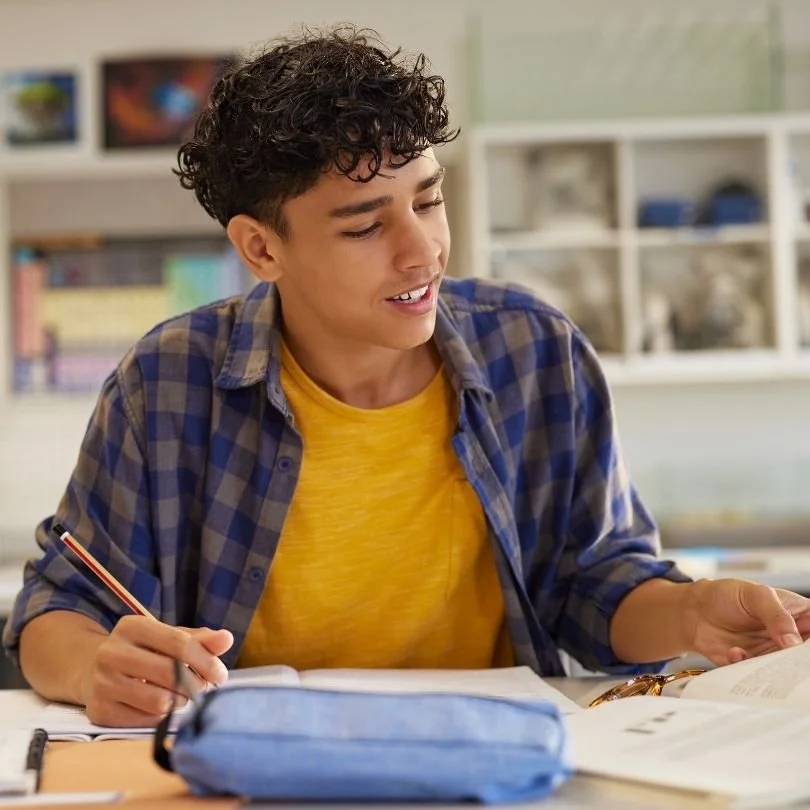Can't Focus in School? Is It a Learning Disorder Or Lack of Motivation?
Struggling to focus in school can be deeply discouraging. It sometimes feels like no matter how hard you try, your attention drifts, motivation fades, and the frustration rises. But before you label yourself as "lazy" or "unmotivated," it's important to slow down and consider a broader picture. Difficulty focusing isn’t always about not trying hard enough. It can stem from a complex set of factors that includes your interest in the subject, the quality of instruction, your unique learning style, emotional health, and sometimes, an underlying learning disorder.
In this post, you’ll learn these different elements with compassion and clarity, so you can better understand what's behind your struggles and discover how a comprehensive learning disorder evaluation could bring you concrete answers and the support you deserve.
The Common Feeling: "I Just Can't Focus!"
When focus slips away during class or when trying to study, it’s normal to feel disheartened. You might wonder, "Am I just not trying hard enough?" or "Why can't I stay motivated like other students?" These questions are more common than you think, and your feelings are valid. But digging deeper, focus issues often have causes beyond mere willpower.
Interest in the Topic: The Spark That Fuels Focus
One of the simplest reasons for difficulty focusing is a lack of interest. If the material feels irrelevant or dull, it’s harder to engage. Your brain naturally gravitates toward things that feel meaningful and stimulating. According to a study from the NIH, student interest is a powerful motivational force that energizes learning, boosts engagement, and contributes significantly to academic success. Without seeing a clear connection between what you’re learning and your personal goals or life, maintaining focus becomes much more challenging.
Educators who tailor lessons to real-world applications or interactive activities often see better student engagement. Conversely, a one-size-fits-all approach may fail to capture your attention. Recognizing your interests and strengths can help you and your teachers create learning experiences that hold your focus.
Key Factors Affecting Your Ability to Focus in School
Your difficulty focusing in school can be influenced by several interconnected factors. Understanding these can help pinpoint what’s behind your struggles and guide you toward effective solutions.
1. Quality of Instruction
Teaching quality plays a big role in how well students can concentrate. Instruction that’s confusing, too fast, or not engaging can make even the most motivated learner tune out. Sometimes, teachers might not be aware that a student needs more guidance or a different approach to grasp the material fully.
If you find yourself frequently lost during lessons, it might be worth having a conversation with your teachers about how the material is presented and what methods help you learn best.
2. Your Unique Learning Style
No two brains learn exactly the same way. Some people are visual learners, others need to hear things, and some learn best by doing. If your current school experience clashes with how you naturally learn, it can cause frustration and loss of focus.
For example, if you’re a kinesthetic learner who struggles to stay still for long periods, traditional classroom settings might be challenging. Understanding your unique learning style is a powerful first step toward adapting study habits and seeking accommodations that optimize your focus.
3. Emotional and Mental Health: The Invisible Impact
Depression, anxiety, and stress can severely affect concentration and motivation. When emotional health is compromised, it’s hard for anyone to stay present, absorb new information, or manage time effectively. A 2022 study published by the National Institutes of Health confirms that these emotional challenges significantly lower academic performance by disrupting focus and learning processes.
Emotional struggles are not a sign of weakness, they are real challenges that can affect the brain’s ability to regulate attention. If you suspect that feelings of sadness, worry, or overwhelm are interfering with your learning, talking to a counselor or mental health professional can help.
4. Interest and Relevance of the Subject Matter
Your focus can also dip when the subject matter doesn’t seem interesting or relevant to your life. When you can’t see how what you’re learning connects to your goals or daily experience, motivation naturally wanes. Teachers who make lessons engaging and relatable help students maintain curiosity and attention. Reflecting on what topics inspire you, or seeking ways to connect challenging material to personal interests, can help reclaim your focus.
5. Environmental and Physical Factors
Physical environment and your body’s condition also influence concentration. Noise, uncomfortable seating, poor lighting, or other distractions in the classroom can derail focus. Additionally, basic needs like sleep, nutrition, hydration, and exercise affect cognitive function. Ignoring these can contribute to difficulty concentrating. Making sure your study environment supports learning and caring for your physical wellness can improve your ability to focus.
Could It Be a Learning Disorder?
When difficulty focusing is persistent and significantly interferes with school performance, a learning disorder might be a cause. Disorders such as ADHD (Attention Deficit Hyperactivity Disorder), dyslexia, or other specific learning disabilities impact how the brain processes information.
These conditions are not about effort or motivation. They reflect differences in brain function that require understanding, patience, and specialized support.
What Does a Learning Disorder Look Like?
Learning disorders can show up in different ways, and the signs are not always obvious at first. Some of the most common challenges include:
Trouble following instructions or organizing tasks.
Difficulty reading, writing, or performing math despite effort.
Being easily distracted or having trouble staying seated.
Forgetting information frequently or struggling to recall what was learned.
Feeling overwhelmed by tasks that seem simple to others.
If these challenges sound familiar, it may be time to consider a professional evaluation.
What Is a Comprehensive Learning Disorder Evaluation?
A comprehensive learning disorder evaluation is a detailed, multi-step process conducted by experts to understand your brain's unique learning profile. It’s designed not just to diagnose but to guide how to best support your strengths and address your challenges.
This evaluation generally includes:
Cognitive Assessments: Tests that measure memory, attention, problem-solving, and reasoning skills.
Academic Testing: Reviews of reading, writing, and math abilities.
Behavioral Observations: How you interact, communicate, and handle tasks in different settings.
Emotional Functioning: Assessment of mental health and emotional well-being.
Medical History Review: To identify any health issues that might impact focus.
The goal is to provide a comprehensive picture of what’s going on, beyond one or two symptoms.
Why Is This Evaluation Important?
A professional evaluation does more than identify challenges. It provides a roadmap for support and growth. The benefits include:
Clarity: You gain a clear understanding of why certain subjects or tasks feel so challenging.
Diagnosis: If a learning disorder is present, a diagnosis can open doors to accommodations like extra time on tests, specialized instruction, or therapy.
Tailored Support: Schools and therapists can develop personalized plans that work with your learning style and needs.
Empowerment: Knowing the root causes helps you advocate for yourself—and realize that your struggles aren’t your fault.
How to Take the Step Toward Evaluation
If focus or learning difficulties persist and start to significantly interfere with school, the first step is to talk with your school counselor. They can listen to your concerns, gather information from teachers and parents, and help identify if further assessment might be needed. School counselors are trained to guide students and families through these early steps and can initiate referrals for educational evaluations within the school system.
If challenges continue despite school-based support, or if there are signs of medical, psychological, or emotional concerns, the next step is to involve a qualified professional such as a pediatrician, psychologist, or therapist. These specialists can rule out or diagnose underlying conditions like ADHD, anxiety, depression, or learning disorders that may affect focus and learning. Collaborating with school staff and healthcare professionals ensures a comprehensive understanding and the right supports are put in place.
Beyond Diagnosis: Finding What Works for You
Remember, a diagnosis (or lack of one) is just the beginning. Whether you find out you have a learning disorder or discover other reasons for your focus challenges, there are strategies and resources available:
Explore different study techniques and learning styles.
Set realistic goals and celebrate small successes.
Balance schoolwork with activities that restore your energy.
Seek support from teachers, counselors, or peer groups.
Prioritize mental health and self-care.
A Compassionate Reminder
Every learner’s journey is unique. Struggling to focus doesn’t mean failure. It means your brain and environment need a different approach, a better fit. With the right understanding, evaluation, and support, you can unlock your full potential and find joy in learning again.
If focus issues feel overwhelming or have persisted for a long time, consider a comprehensive learning disorder evaluation. It could be the key to not just academic success but emotional well-being and self-confidence. By seeking answers and advocating for yourself or your child, you’ve taken the most important first step. Focus is possible, and so is thriving in school and life.
If you or a loved one is struggling with focus or learning challenges, Verdant Psychology is here to help. Our compassionate team offers thorough evaluations and personalized support to guide your journey toward clarity and growth. Book a free consultationt today to start the conversation and take the next step.
Frequently Asked Questions
What is a learning disorder evaluation?
A learning disorder evaluation is a thorough assessment that identifies if a student has a neurological condition affecting learning. It measures academic skills like reading, math, and writing and compares them to cognitive abilities. The goal is to provide clarity and guide support or accommodations.
Who conducts learning disorder evaluations?
Evaluations are typically conducted by licensed psychologists, educational specialists, or neuropsychologists. Sometimes speech therapists or school psychologists are involved too. These professionals use standardized tests and observations to assess academic abilities, cognitive functioning, behavior, and emotional health to understand learning challenges.
How long does a learning disorder evaluation take?
The evaluation process can take anywhere from three to nine hours, often spread across multiple sessions. This allows time for cognitive, academic, behavioral, and emotional assessments with breaks to prevent fatigue, ensuring the results are thorough and accurate.
Can learning disorders be diagnosed without an IQ test?
A comprehensive evaluation usually includes an IQ test as one part, but diagnosis depends on academic achievement tests and other measures too. IQ tests assess cognitive abilities, but learning disorders focus on the gap between intelligence and specific academic skills, not intelligence alone.
What happens after a learning disorder evaluation?
After the evaluation, professionals provide a detailed report explaining findings and recommendations. If a learning disorder is diagnosed, it guides tailored interventions, educational accommodations, or therapies to support learning. Families and schools use this information to create effective plans for academic success.









